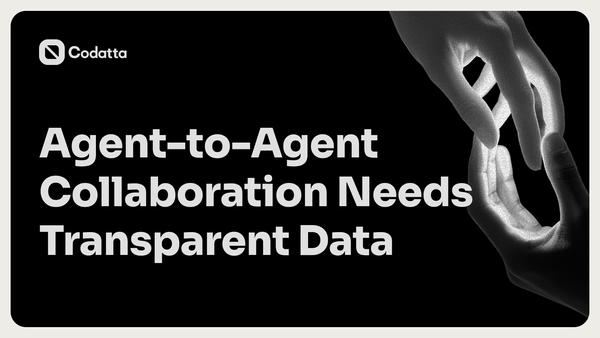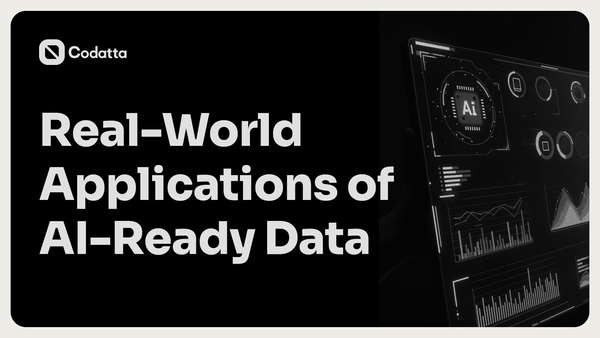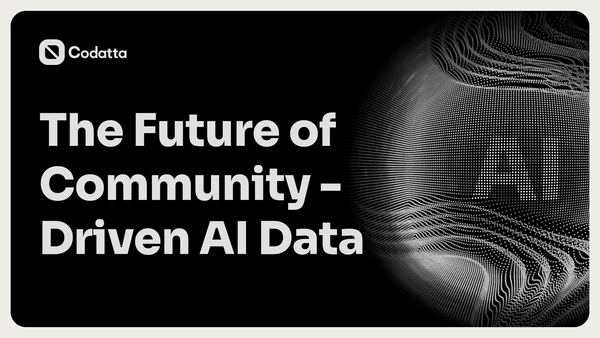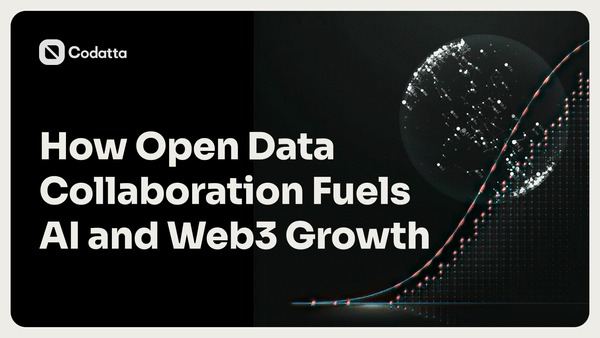Healthcare and AI: Why Metadata Integrity Matters
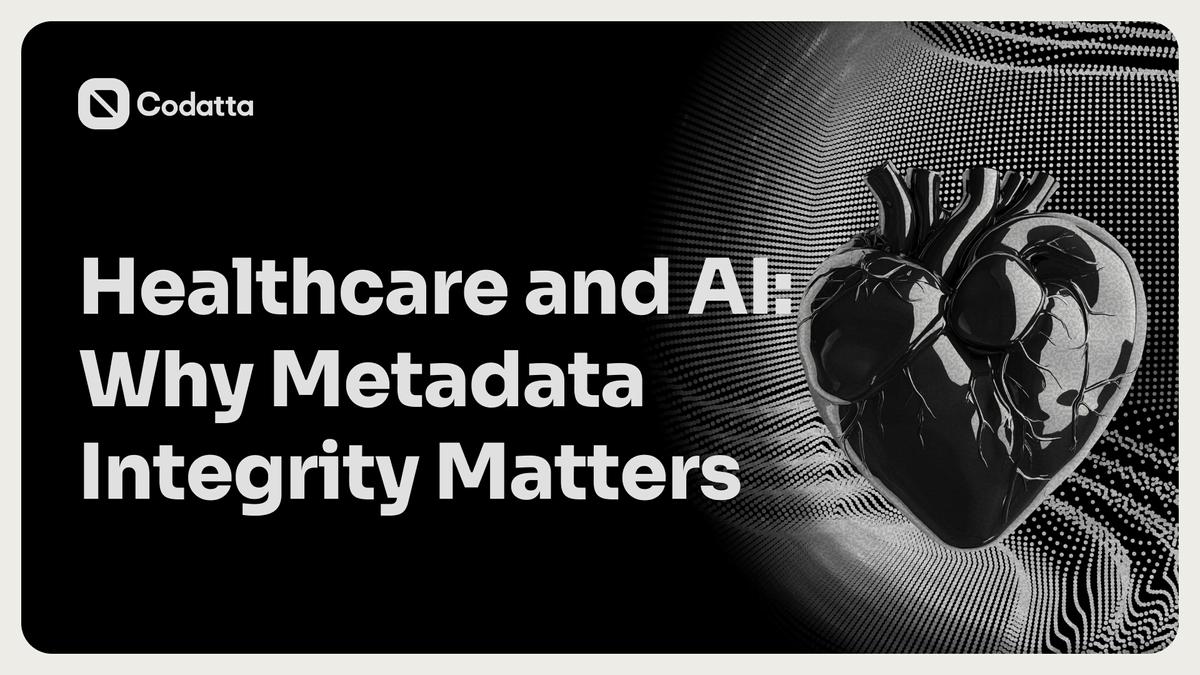
AI is becoming central to healthcare, from diagnostics and patient monitoring to drug discovery. But the success of any AI system depends on more than algorithms. It requires reliable metadata and strong data integrity. Without accurate metadata and clear provenance, data management breaks down, data quality suffers, and risks grow for both patients and providers.
In a field governed by strict standards and regulatory compliance, metadata and data governance are not optional. They form the framework that ensures data can be trusted, shared, and used responsibly in healthcare AI use cases.
Read on to see why reliable metadata is key to building trustworthy AI in healthcare.
The Role of AI in Healthcare
AI is transforming healthcare in real and high-impact ways — from diagnostics and patient monitoring to drug discovery and predictive analytics. Tools like AI-assisted stethoscopes and diagnostic imaging now help detect conditions faster and more accurately.
But none of this works without good metadata. Metadata management ensures that an AI model knows what the data means, where it’s from, and whether it can be trusted. It’s part of the larger data infrastructure that supports data quality, compliance, and structured metadata practices.
Healthcare organizations rely on metadata to guide AI training, maintain data governance, and protect patient data integrity. Without comprehensive metadata such as timestamps, sources, and context, even the most advanced AI technologies fail to deliver responsible, scalable outcomes. Metadata helps AI deliver on promises, and in a regulated industry like healthcare, metadata governance is not optional; it is essential for safe and compliant AI use.
Risks of Poor Metadata Integrity
Healthcare data is complex and comes from many different sources: imaging systems, electronic health records, lab results, wearables, and clinical trials. Without consistent metadata practices, this information often ends up in silos, making it difficult for AI systems to connect and analyze effectively. A weak or fragmented metadata management system means critical details — such as data sources, timestamps, or patient context — may be incomplete or missing. As a result, even advanced AI models cannot deliver reliable outcomes.
Inconsistent or duplicate metadata also creates serious risks. If a dataset is mislabeled or lacks proper data lineage, AI outputs can become biased, leading to errors in diagnostics or patient monitoring. These issues don’t just weaken model performance; they also increase compliance risks under regulatory frameworks. For example, the FDA’s AI/ML Action Plan (2021) stresses the importance of transparency in training data, while the WHO Global Strategy on Digital Health (2020–2025) highlights the need for governance frameworks that enforce accountability and data protection.
Real-world examples show why metadata matters. A study published in Nature Medicine (2020) described how incomplete or poorly annotated imaging datasets led to reduced accuracy in cancer detection AI models. Without verified metadata documenting equipment settings, patient demographics, or scan conditions, the AI system misinterpreted patterns — a problem that could have been avoided with robust metadata governance.
Metadata also plays a key role in managing sensitive healthcare data. Without proper traceability, hospitals cannot verify how patient records are being used, exposing them to privacy and compliance violations under frameworks such as HIPAA or GDPR. In this context, metadata is essential for safe, responsible, and compliant AI use.
In short, metadata integrity is the foundation of trustworthy healthcare AI. Robust metadata management ensures that generative AI tools and diagnostic models use data that is accurate, traceable, and compliant, reducing the risk of bias, errors, and regulatory breaches.
Metadata Integrity as a Pillar of Trustworthy AI
In healthcare systems, metadata integrity refers to the verifiable origins, accuracy, and consistency of information attached to medical data. A strong metadata system ensures that timestamps, device settings, and patient context are captured and preserved in a clear data structure. Without these elements, even advanced AI applications risk delivering unreliable outcomes.
Metadata integrity strengthens both data quality and accountability. By tracking data through its lifecycle, healthcare providers and researchers can confirm how information was collected, stored, and used in AI training. Automated metadata tools now play an important role in maintaining consistency, reducing human error, and aligning datasets with governance frameworks such as HIPAA in the U.S. and the EU AI Act in Europe. Both emphasize metadata and traceability as requirements for transparent and compliant AI governance.
Reliable metadata practices also support patient safety. In diagnostic imaging, for example, missing or inconsistent metadata about the source or calibration of a scan can lead to errors in AI-assisted interpretation. With structured metadata and clear tracking data, healthcare organizations can ensure data protection, regulatory compliance, and responsible use of AI across clinical workflows.
How Web3 Strengthens Metadata Integrity
Web3 technologies offer a new way to manage metadata in healthcare by using blockchain for provenance and traceability. Each entry in a medical dataset can be recorded on an immutable ledger, making it possible to verify its origin and maintain integrity throughout the AI lifecycle. For healthcare leaders, this adds accountability when using AI in diagnostics, drug discovery, or patient monitoring.
Blockchain also improves data privacy and controlled access. Contributors can decide how their information is shared, while cryptographic methods protect sensitive health records. Metadata provides the structure for robust data use, ensuring that existing metadata is not lost or altered as datasets move between systems.
Studies from the World Economic Forum on blockchain for healthcare data management and reports from the OECD on digital health governance highlight that provenance and secure metadata practices are becoming essential. In regulated sectors like healthcare, reliable metadata tracking strengthens trust, supports compliance, and helps organizations deploy AI responsibly.
Codatta’s Contribution and Why Metadata Integrity Matters
Codatta’s metadata annotation framework is built for blockchain addresses. The same approach can inform domains where data integrity and accountability matter. Contributor input, confidence scoring, and on-chain records help assess and evidence the quality of rich metadata. This strengthens the role of metadata in maintaining trustworthy datasets and directly supports responsible AI initiatives.
On its metadata platform, key metadata fields are tracked and validated, helping improve AI performance across different use cases. A clear metadata strategy ensures that information stays consistent and usable, while data integrity and generate processes are supported by transparent, traceable records.
In healthcare, this model has potential to support fraud detection in claims, improve visibility in medical IoT supply chains, and enable transparent demographic annotation. Codatta does not process patient medical records or accept data revealing individual ownership of wallets or accounts. Metadata plays a crucial role here by creating structured, reliable records that can be used to train and validate AI systems without losing accountability.
Codatta includes quality checks and confidence scoring in its process, showing how metadata management can align with responsible AI practices and create a foundation for stronger AI initiatives across sensitive industries.
Conclusion
Metadata is essential in healthcare AI because it helps ensure that the metadata behind every dataset is accurate and verifiable. Metadata refers to the details that allow systems to track sources, confirm integrity, and protect patients. Without metadata needed for lineage and validation, even advanced tools cannot be trusted.
In this role in healthcare, reliable metadata supports safer diagnostics, stronger compliance, and more effective use of AI. Community-driven platforms like Codatta show how contributions within metadata can be structured and rewarded, offering models that healthcare organizations could use to build systems that leverage AI with confidence.
Disclaimer: Codatta focuses on blockchain metadata annotation, confidence scoring, and on-chain provenance. It does not provide medical diagnosis or clinical decision support.

